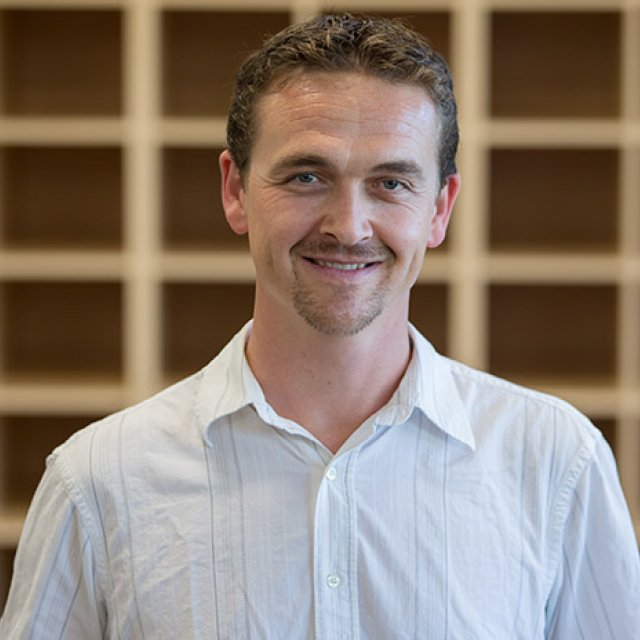
Dr. Brandon Sawyer, professor of biology and kinesiology and chair of the Department of Kinesiology, has been on faculty at PLNU since 2013. We sat down with him to find out more about his background and recent research in maximal exercise and weight loss.
Q: You graduated from PLNU with a degree in kinesiology and athletic training. What first sparked your interest in these fields?
A: I first became interested in sports medicine during my senior year of high school after I fractured my pelvis in football and my knuckle in basketball. This knocked me out of playing sports that year, but I spent a lot of time around sports medicine professionals and realized I would love to work in a field where I helped athletes recover from injuries. During my junior year at PLNU, I took exercise physiology and was blown away by the beautiful complexity of the human body. Studying physiology was something that made me come alive. When I considered spending my career lighting that same fire in students — and studying and researching exercise physiology — I was sold.
Q: You have researched maximal exercise performance, obesity, and cardiovascular disease. What led you to these areas?
A: Studying the physiology of maximal exercise, you consider all aspects of physiology and how they work together under very intense conditions. The human body is designed to exercise — it optimizes our physiology and significantly reduces our risk for most chronic diseases. Studying how exercise prevents and treats disease is exciting to me because cardiovascular disease and type 2 diabetes are leading causes of death in the U.S. and both are strongly impacted by exercise and diet.
Q: CBS News, ABC News, and The New York Times have featured your most recent research. What have you discovered about weight loss and exercise?
A: I ran this study during my Ph.D. program at Arizona State University. We asked 81 sedentary women to complete 12 weeks of vigorous exercise without changing their diets. We then assessed body composition and cardiorespiratory fitness. To our surprise, after 12 weeks of exercise, about half the women had actually gained body fat, while the other half lost fat! This amount of exercise is actually below the recommended amount for weight loss without diet, so we didn’t expect much weight loss. Many studies have shown that some people overcompensate in response to exercise by eating more or moving less. The purpose of the study was to predict which women would overcompensate and gain fat and which ones would not — and we found that the strongest predictor of fat gain at 12 weeks was weight gain after four weeks. This early change in weight may be a critical time to reassess the program being used and either add more exercise or add calorie restriction. Another very positive finding was that even if women gained fat, they still improved their cardiorespiratory fitness, a much stronger predictor of cardiovascular disease than body fat.
Q: You mentioned that the women in your study gained body fat but still became healthier. How is this possible?
A: Many people point to body fat as the cause of certain chronic diseases. If this were the case, then losing fat would be necessary for health improvements. In my research with colleagues, we’ve found more than 300 peer-reviewed papers that involved an exercise or diet intervention with overweight and obese subjects that did not lead to fat loss. In these studies, subjects improved their health in the absence of fat loss and sometimes even with fat gain. We also found ample evidence for improvements in type 2 diabetes and cardiovascular disease risk, blood glucose and blood pressure, cholesterol levels, artery function, blood clotting, inflammation, and insulin sensitivity — all without weight loss. We’ve published these findings in a peer-reviewed journal article and two textbook chapters. This is a very hopeful message because so many people start exercising or dieting with the goal of weight loss, and so many stop because they do not achieve that goal. My advice is to make the goal exercise and a healthy diet, no matter what effect this has on your weight. If you make these lifestyle changes, you may or may not lose weight, but you will become healthier!
Q: What is your health advice to PLNU students and sedentary adults who may spend hours working at a desk? What’s your ideal fitness regime?
A: The ideal regime is the one people will actually do. There are benefits from all types of exercise, from walking 10 minutes a day to exercising intensely for two hours a day. Brisk walking for 30 minutes, five days a week, is enough to lower the risk of cardiovascular disease and type 2 diabetes significantly. High-intensity interval training has very powerful effects for health that can be gained with a much shorter time commitment. I’ve been a bike commuter for the last 15 years and riding to work is part of my normal day. You can take daily walks at lunch, park your car a longer distance from your office, have a dog that needs to be walked every day — any activity that is permanently scheduled into your day is terrific for health.
Q: What is our responsibility as Christians to care for our bodies?
A: As beings created in God’s image, we have been entrusted by God with the most amazing and beautiful work of His creation: our bodies and minds. It is up to us to do all we can to take care of ourselves. I also believe that the holiness we are called to in the Bible (Leviticus 20:26, 1 Peter 1:16) requires that we maintain a wholeness of mind, body, and spirit as best as we can. Exercising is one very powerful way to help us achieve that kind of wholeness through optimizing our physical and mental health.

The Viewpoint
PLNU's university publication, the Viewpoint, seeks to contribute relevant and vital stories that grapple with life's profound questions from a uniquely Christian perspective. Through features, profiles, and news updates, the Viewpoint highlights stories of university alumni, staff, faculty, and students who are pursuing who they are called to be.